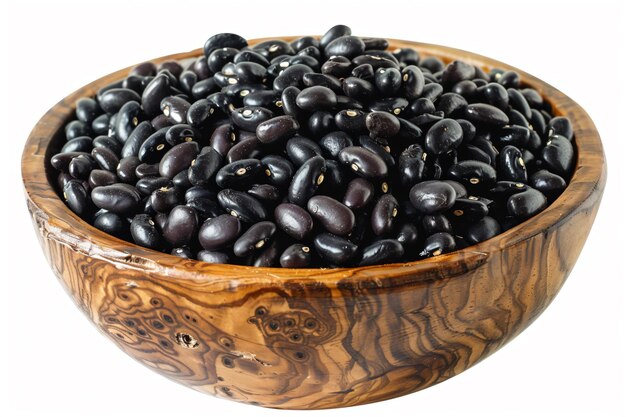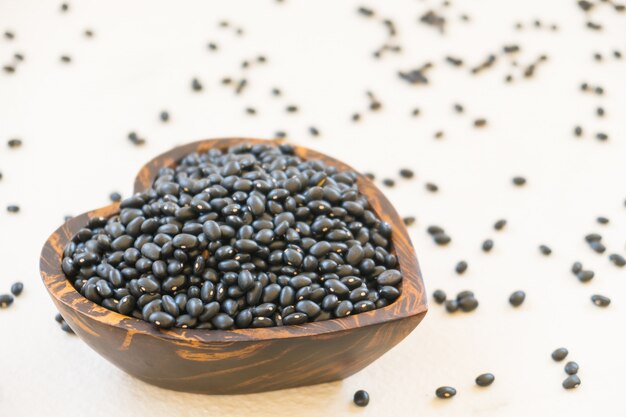Black beans are a staple in cuisines worldwide. Their rich, earthy flavor and versatility make them a favorite in soups, salads, and main dishes. But beyond their culinary appeal, are black beans healthy? Absolutely! These legumes are nutritional powerhouses packed with essential nutrients and health benefits. Let’s dive into the details.
Nutritional Profile of Black Beans
Black beans are highly nutritious, offering a balance of macronutrients and micronutrients. They provide energy and support overall health.
Macronutrients
Black beans are an excellent source of macronutrients, which are essential for energy and bodily functions.
- Protein:
A cup of black beans contains about 15 grams of protein. This makes them an excellent plant-based protein source, especially for vegetarians and vegans. Proteins are vital for muscle repair, immune support, and enzyme production. - Carbohydrates:
Black beans provide complex carbohydrates, offering a steady energy release. Unlike refined carbs, their high fiber content prevents blood sugar spikes. This makes them ideal for managing diabetes and improving satiety. - Fiber:
A standout feature of black beans is their fiber content—approximately 15 grams per cup. Fiber promotes digestive health, reduces cholesterol, and helps maintain a healthy weight.
Micronutrients
Black beans are loaded with essential vitamins and minerals.
- Iron:
They are a good source of non-heme iron, which supports red blood cell production. Pairing black beans with vitamin C-rich foods enhances iron absorption. - Magnesium:
Magnesium in black beans aids in muscle function, nerve health, and bone development. One cup provides nearly 30% of the daily recommended intake. - Folate:
Folate, a crucial B-vitamin, supports DNA synthesis and cell growth. It’s especially beneficial for pregnant women to prevent neural tube defects in babies. - Antioxidants:
The dark color of black beans comes from anthocyanins, powerful antioxidants that combat oxidative stress and inflammation.
Health Benefits of Black Beans
Black beans are a versatile and nutritious food that can be included in various meals. Packed with essential nutrients, they offer a wide range of health benefits that make them a staple in healthy diets worldwide. Let’s explore the many reasons why black beans are a superfood.

Rich in Nutrients
Black beans are a powerhouse of vitamins and minerals essential for overall health.
- Protein: Provides the building blocks for muscle repair and immune function.
- Fiber: Promotes digestive health, reduces cholesterol, and helps control blood sugar levels.
- Iron: Supports oxygen transport in the blood, preventing anemia.
- Magnesium: Aids in nerve function, muscle health, and energy production.
- Folate: Essential for cell growth and DNA synthesis, particularly important during pregnancy.
Supports Heart Health
The high fiber, potassium, and magnesium content in black beans contribute to cardiovascular health.
- Lowers Cholesterol: Fiber reduces LDL (bad cholesterol) levels, lowering the risk of heart disease.
- Regulates Blood Pressure: Magnesium and potassium help relax blood vessels, reducing hypertension.
- Antioxidants: Anthocyanins in black beans combat oxidative stress, which can damage heart tissue.
Promotes Digestive Health
Black beans are rich in dietary fiber, which plays a crucial role in maintaining a healthy digestive system.
- Improves Regularity: Insoluble fiber promotes bowel movements, preventing constipation.
- Gut Health: Fiber feeds beneficial gut bacteria, enhancing microbiome balance and immunity.
Helps with Weight Management
Black beans are low in fat but high in protein and fiber, making them filling and ideal for weight management.
- Satiety: Fiber and protein promote a feeling of fullness, reducing overeating.
- Steady Energy: Complex carbohydrates in black beans prevent blood sugar spikes, keeping hunger at bay longer.
Regulates Blood Sugar
Black beans have a low glycemic index and are high in fiber, which can help manage blood sugar levels.
- Slower Digestion: Fiber slows the absorption of sugar, preventing spikes.
- Ideal for Diabetics: The combination of low GI and high protein supports blood sugar control.
Boosts Bone Health
Black beans are rich in minerals like calcium, magnesium, and phosphorus, which are crucial for maintaining strong bones and teeth.
- Bone Density: Magnesium supports bone mineralization.
- Prevents Osteoporosis: Adequate mineral intake reduces the risk of age-related bone disorders.
Provides Antioxidant Protection
The dark color of black beans comes from anthocyanins, powerful antioxidants.
- Fights Free Radicals: Protects cells from oxidative damage.
- Reduces Inflammation: Anthocyanins combat chronic inflammation, a risk factor for many diseases.
- Anti-Aging Benefits: Antioxidants improve skin health and slow signs of aging.
Supports Muscle and Tissue Health
Black beans are an excellent source of plant-based protein.
- Muscle Repair: Protein helps rebuild tissues after exercise or injury.
- Energy Boost: Iron supports oxygen delivery to muscles, improving stamina.
Enhances Brain Health
The folate and magnesium content in black beans benefits the brain.
- Cognitive Support: Folate supports neurotransmitter production, aiding memory and focus.
- Stress Reduction: Magnesium helps manage stress and anxiety by relaxing nerves.
Affordable and Accessible Superfood
Black beans are not only nutritious but also economical and widely available. This makes them an easy addition to diets around the world, ensuring people can access essential nutrients without breaking the bank.
Related to Read: Black Bean & Taquitos Mango Recipe
Potential Concerns and Considerations
While black beans are healthy, they may pose minor challenges for some individuals. Proper preparation can address these concerns.
Digestive Issues
Black beans contain compounds called oligosaccharides, which can cause gas and bloating. These sugars are not easily digestible, leading to discomfort for some.
- To reduce these effects, soak black beans overnight before cooking. This helps break down oligosaccharides.
- Adding spices like cumin or ginger to dishes can further aid digestion.
Preparation Methods
Preparation plays a key role in maximizing the benefits of black beans. Improper cooking can lead to issues like undercooked beans, which are hard to digest.
- Always rinse and sort through dried beans to remove debris.
- Cook black beans thoroughly, as this neutralizes anti-nutrients like phytic acid, which can hinder mineral absorption.
Incorporating Black Beans into Your Diet
Adding black beans to your meals is easy and rewarding. Here are some tips to get started.

Cooking Tips
Cooking black beans is simple with a few essential steps:
- Soaking:
Soak black beans overnight or for at least 8 hours. This softens them and reduces cooking time. For quick preparation, try the “quick soak” method—boil the beans for 2 minutes, remove from heat, and let them sit for an hour. - Cooking:
After soaking, rinse the beans and simmer them in fresh water for 1-2 hours until tender. Add salt toward the end to avoid toughening the skin. - Canned Beans:
If you’re short on time, canned black beans are a great alternative. Rinse them well to remove excess sodium.
Recipe Ideas
Black beans shine in a variety of dishes, from traditional recipes to creative fusions. Here are some ideas:
- Black Bean Soup:
A hearty, comforting dish made with onions, garlic, tomatoes, and spices. Garnish with cilantro and lime for added flavor. - Black Bean Salad:
Combine black beans with corn, bell peppers, red onions, and a tangy lime dressing for a refreshing side dish. - Burritos or Tacos:
Use black beans as a filling in burritos or tacos. Add rice, avocado, salsa, and your favorite toppings for a satisfying meal. - Black Bean Burgers:
Blend black beans with breadcrumbs, spices, and an egg substitute to make plant-based patties. Grill or bake them for a delicious burger alternative.
Comparing Black Beans to Other Legumes
Black beans stand out among legumes, but how do they compare to others?
Nutritional Differences
- Kidney Beans:
Kidney beans have slightly more calories and less fiber than black beans. They are also a good source of iron but lack the anthocyanins found in black beans. - Chickpeas:
Chickpeas are higher in calories and carbohydrates but lower in protein compared to black beans. They are an excellent source of folate and manganese. - Lentils:
Lentils cook faster than black beans and are rich in protein and iron. However, black beans have more antioxidants.
Health Benefits
- Heart Health:
Black beans are especially rich in anthocyanins, which protect against heart disease. - Digestive Health:
Their fiber content outshines many legumes, making them excellent for gut health. - Weight Management:
Compared to others, black beans provide lasting satiety due to their protein and fiber content.
Frequently Asked Questions
Are Canned Black Beans Healthy?
Yes, canned black beans are nutritious and convenient. However, they may contain added sodium. Opt for low-sodium varieties and rinse them thoroughly to reduce salt content.
How Much Black Beans Should I Eat?
A healthy serving size is about ½ to 1 cup per meal. Incorporating them 3-4 times a week can provide consistent health benefits.
Conclusion
Black beans are a nutritional powerhouse, offering an excellent balance of protein, fiber, and essential vitamins and minerals. They are versatile, affordable, and beneficial for heart health, digestion, and weight management. When prepared properly, they are easy to digest and a joy to eat. Whether you prefer them in soups, salads, or tacos, black beans are a delicious way to enhance your diet.

